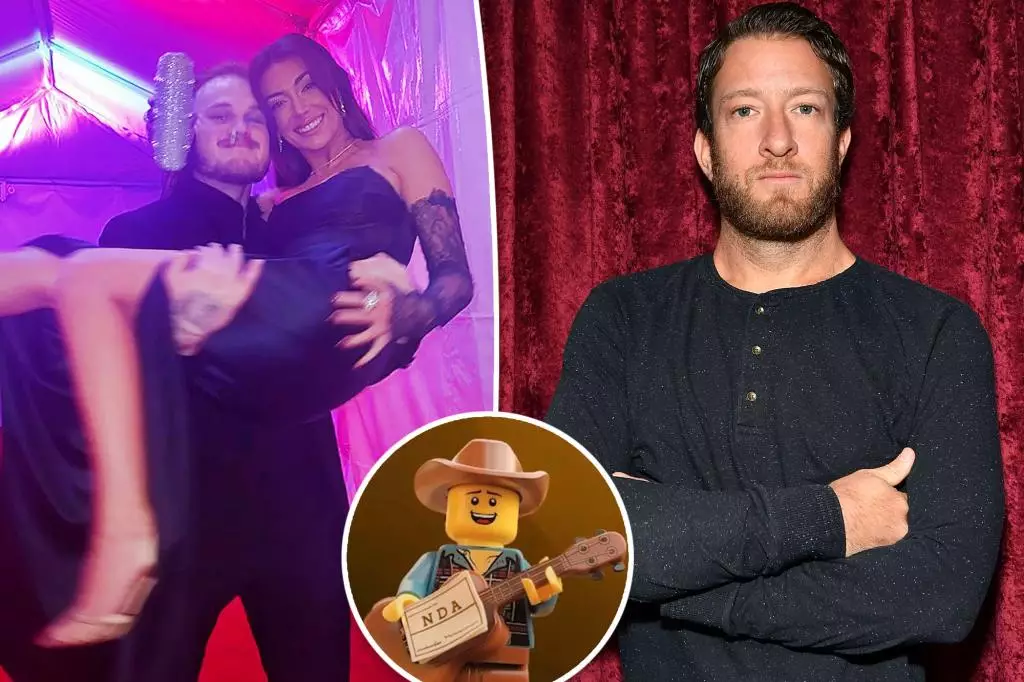In an era where social media interactions can escalate into grandiose public spectacles, the ongoing feud between Barstool Sports founder Dave Portnoy and country singer Zach Bryan has taken on an unexpected artistic form. This conflict, marked by Portnoy’s sharp-witted diss tracks, continues to intrigue fans and critics alike. The latest installment, characterized by its biting lyrics and multimedia presentations, showcases not only Portnoy’s creative prowess but also raises questions about the consequences of personal conflicts being aired in public domains.
The release of Portnoy’s latest diss track, targeted at Bryan, is emblematic of a broader cultural trend where personal disputes are laid bare in a format that is both entertaining and provocative. Portnoy’s song, which labels Bryan as “Country Diddy,” cleverly draws parallels between the country star and controversial figures in the music industry, most notably Sean Combs. This comparison serves to underscore Bryan’s alleged misdeeds against his former partners and enhances Portnoy’s narrative by aligning it with contemporary issues surrounding accountability and public persona. By leveraging the diss track format, Portnoy not only conveys his grievances but also engages a wider audience through entertainment.
One cannot overlook how diss tracks often blur the line between personal conflict and public entertainment. The lyrics make bold assertions about Bryan’s character and actions while injecting humor and sarcasm—hallmarks of Portnoy’s style. Lines like “Steal another story write another Country Ditty” not only function as pointed jabs but also provide commentary on Bryan’s songwriting process, hinting at a perceived lack of originality influenced by his personal life experiences.
The music video accompanying the diss track amplifies the conflict further, featuring symbolic imagery such as a Lego figure holding an NDA. This choice reflects a deeper commentary on today’s entertainment landscape, where non-disclosure agreements often play a crucial role in managing public narratives. The juxtaposition of Portnoy’s lyrics with visual elements that mock Bryan’s situations succeeds in elevating the diss from mere entertainment to a commentary on fame, privacy, and the power dynamics involved in relationships.
Portnoy’s assertion that Bryan attempted to “shut him up” by employing legal tactics only adds an additional layer to the dispute. This element of the narrative not only portrays Bryan in a negative light but also portrays Portnoy as someone unafraid to challenge authority. His declaration that he would continue to produce diss tracks regardless of the circumstances introduces an underdog commentary, reminiscent of classic rap battles where resilience and creativity thrive in the face of adversity.
The ramifications of this feud extend past entertainment into the realm of personal relationships, particularly for Brianna “Chickenfry” LaPaglia, who has shared her own traumatic experiences with Bryan during their relationship. LaPaglia’s social media commentary, calling the diss track “lethal,” demonstrates how intertwined these personal stories become with the public spectacle. The accessibility of platforms like Instagram and TikTok allows individuals to voice their stories in ways that can resonate widely, leading to supportive or dissenting reactions from the audience.
While LaPaglia’s candid revelations about alleged emotional and financial manipulation by Bryan open a larger discussion regarding accountability and the treatment of women in relationships, they also serve to reinforce the drama that fuels interest in the conflict. Here, personal narratives and public personas collide, resulting in a multifaceted portrayal of modern relationships in the age of social media.
Ultimately, the ongoing saga between Portnoy and Bryan epitomizes the intersection of entertainment, social commentary, and personal grievances. As Portnoy continues to produce diss tracks in response to Bryan’s perceived misdeeds, one must ponder the implications of turning personal disputes into publicly consumed narratives. The spectacle serves not only as a source of amusement but also as a stark reminder of the complexities and repercussions involved when celebrity life merges with interpersonal drama. In this digital age of relentless content creation, it remains to be seen how this rivalry will evolve and what it will reveal about the nature of conflict in the public eye.

